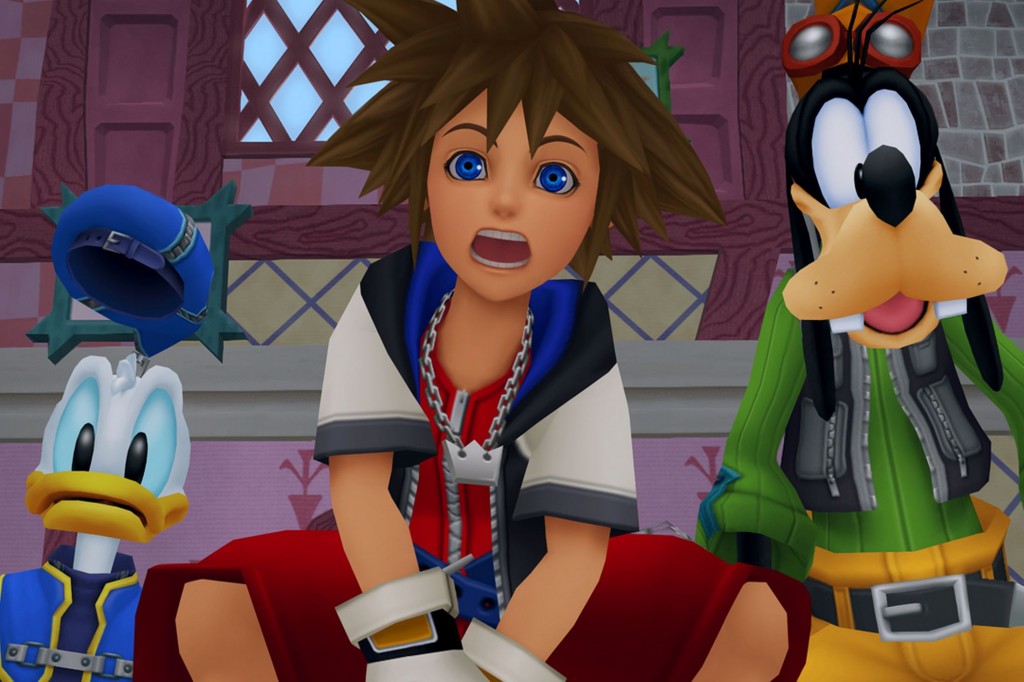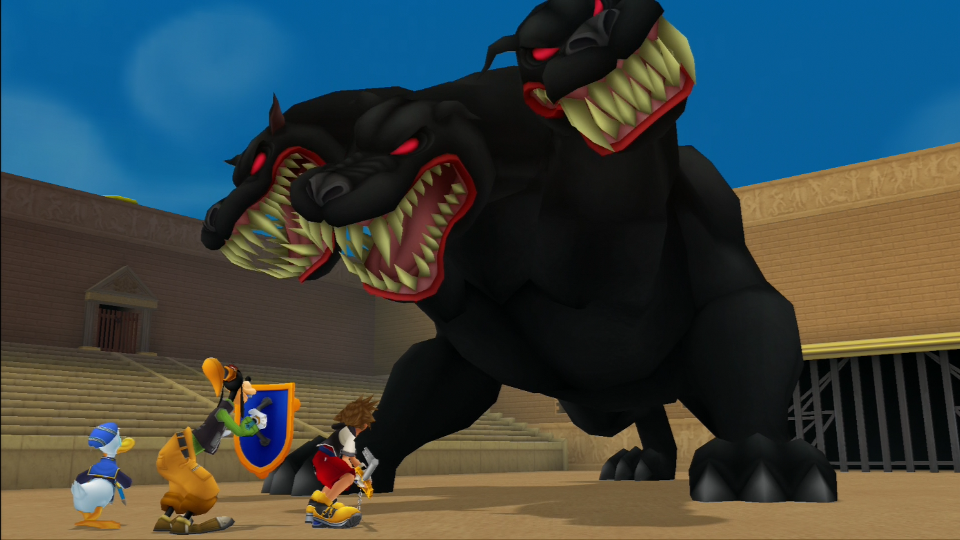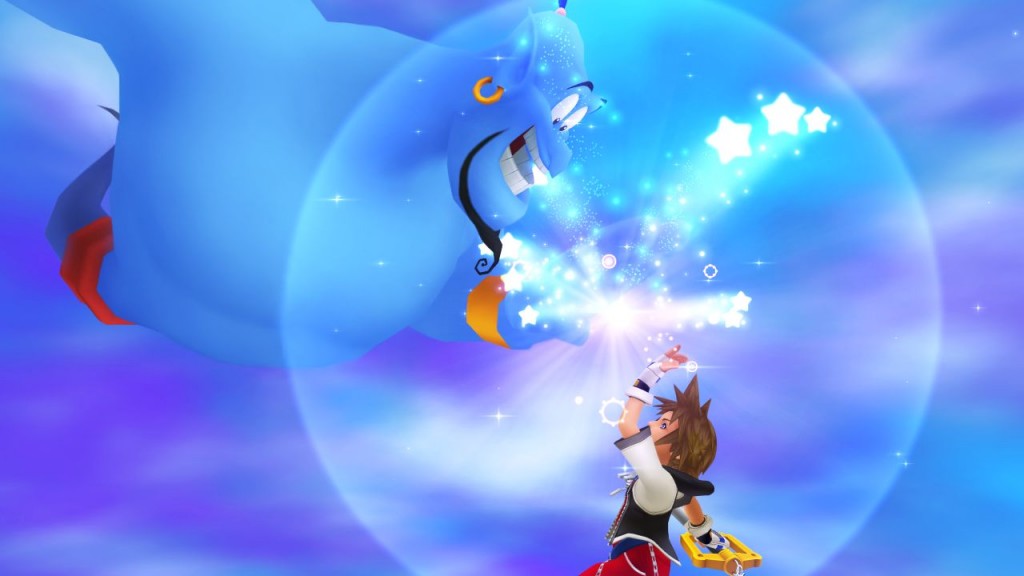By Andrew Tucker
Video games don’t make me cry. I’ll stifle back tears during movies, and I’ve even been known to get choked up over a book or two, but video games are different. It could be because of the kinds of video games I play, such as Pokémon and The Legend of Zelda, all of which are very character-centered but lack a certain gravitas or emotional anchor. I’ve opted out of games like Final Fantasy because, while they have an engaging storylines, they feel more akin to playing through a well-written novel rather than a video game. This is why Disney and Square Enix’s Kingdom Hearts came out of left field for me: here, I was confronted by both whimsical character-development and emotional depth.
As a kid, I idolized Luke Skywalker from Star Wars; as an adolescent, I aspired to be Dragon Ball’s Son Goku; and as an adult, I still relate to Batman. This being said, as far as video games are concerned, I’ve always been a Nintendo guy. Nintendo has a pantheon of loveable, root-able characters. I don’t care how lackluster it might be, I will purchase every Nintendo system just to play the latest Legend of Zelda title because, in the corners of my childlike heart, I am Link; I may not brandish the Master Sword, but as an English teacher, I certainly wield the red pen enough.
The point here is that heroic journeys and myths are the building blocks of my own character. So when I picked up the recent HD release, Kingdom Hearts 1.5 HD Remix, I knew I was going to enjoy it, at least on a surface level; my mom works for the Disney Store, and I grew up with the Disney characters as my fairy tales.
Kingdom Hearts combines the moody, epic world of Final Fantasy and the “happily-ever-after” world of Disney fairy tales. A fun gimmick, right? Wrong. Well, not wrong, but woefully oversimplified. Every choice made to combine these worlds is deliberate and develops a crucial theme: while fairy tales and the heroes of our youth can certainly help us on our journeys in life, victory doesn’t always translate to “happily ever after.”
In the simplest of terms, Kingdom Hearts centers around two characters: Sora and Riku. They are childhood friends and rivals who both vie for the attention of a girl named Kairi. They are children when we meet them, but they don’t stay that way for long. Their world is literally torn apart when a dark force called the Heartless destroys their home and creates schisms across different worlds. This transports Sora into the world of the Disney classics.
As you traverse the various worlds from the Disney canon—Neverland, Wonderland, and Agrabah, to name a few—you meet some of the heroes from those worlds who will join your team; however, these characters join you only for the time you spend in those worlds, so the novelty of having Tarzan or Jack Skellington run around and fight with you is fleeting.
The focus of the game sits squarely in the lap of the game’s protagonist, Sora. The Disney characters loosely play out their respective movie plots, but this time the villains are all working together to control the Heartless for their own machinations. Sora helps the heroes save their friends and loved ones, and in return they help Sora not only to find Kairi and Riku, but to appreciate his new friends.
From here on, I’ll be discussing the end of the first game, so if you’re avoiding spoilers, I suggest you minimize this article, finish the game and dry your eyes, then come back and read the rest. This is where the game ingrained itself into my childlike soul.
In the end, Sora unwillingly plays the dutiful martyr. Riku gives himself over to the Heartless, but ends the game by shutting himself away to keep the Heartless at bay, instructing Sora to keep Kairi safe. Shortly thereafter, Sora and Kairi are also separated. As Sora helplessly calls after Kairi, the credits roll, and we see the classic Disney characters share their “happily ever afters” together: Aladdin is with Jasmine; Belle is with the Beast; Ariel is with her friends, Sebastian and Flounder; Pinocchio is with his father, Geppetto. That’s when it hit me: all of the Disney characters gain their loved ones, while Sora, Riku, and Kairi all lose what is most important to them—each other.
There’s something both comforting and tragic about Sora being lost with only Donald and Goofy for companionship. The whole game reflects separation, all the while looking for guidance. Disney could have just thrown their properties into the game to appeal to a younger audience or for nostalgia’s sake, but Sora learns important lessons through these characters’ trials. Just as we participate in the stories we read and watch, the stories participate in his life; and in doing so, they enlighten him.
I have always looked to my heroes for both entertainment and inspiration. I was not prepared for the hardship of teaching during my first assignment, and in my despair—no, I do not use that word lightly—I thought, “If I’ve invested so much into hero worship, where is the payoff? Where are my heroes now?” I’m not kidding here, I actually sat at my desk during my planning period, stared into the various comic book posters around my room, and wondered who was going to save me.
I had so much to learn. In the end, I didn’t need a hero to save me; I needed to become the heroes I admired. It’s not so much their deeds as their personal triumphs that inspire me. Sure, I love a good fight between Batman and the Joker, but what makes Batman so inspiration is not the knock-out punch, but his unshakeable moral code. I suppose that all came flooding back to me as Sora, Donald, and Goofy walk into the unknown at the end of Kingdom Hearts. The heroes of those fairy tales didn’t save Sora, and Sora didn’t save them. They all had their own quests, and they accomplished those quests by helping each other, just as I had to overcome my fear—not with my childhood heroes, but by their example.
There is true honesty here in a game full of fairy tales. The happy endings of those stories aren’t literal—Aladdin being reunited with Jasmine is balanced by Sora losing his love while still having saved her. True love, according to Kingdom Hearts, is a balance between the unconditional happiness of fairy tales and the compromises of real life. Fiction isn’t meant to be taken literally, it’s a metaphor. What I relate to in Batman is not a sense of vigilante justice and an affinity for capes and cowls, it’s the idea that I can be stronger than my own self-imposed limits. This is the same lesson Sora learns: victories in life should be celebrated, even if they come at prices not paid by our fictional heroes. Fiction is joyous, but joy in reality is bittersweet.
By day, Andrew Tucker is an English teacher for Carroll County Public Schools, but by night…he sleeps because he is a public school teacher. He does take repose with his darling wife Sydney, and his many hobbies, such as action figure collecting, video game playing, and general pontificating on nerd culture.





Thanks so much to the people of Deadshirt for posting my thoughts on Kingdom Hearts. I truly appreciate it!